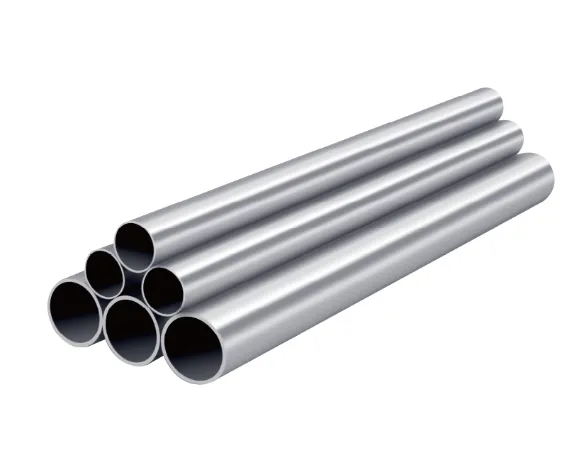Aluminum vs. Precision Steel Tubes for Furniture: A Lifecycle Cost Analysis
Apr . 07, 2025 13:05
From metal table frames to structural rectangular steel columns and square steel columns, this analysis examines how material selection impacts performance, economics, and sustainability across a product's entire lifespan.

Aluminum vs. Precision Steel Tubes: Material Properties and Structural Performance
Precision steel tubes dominate applications requiring uncompromising strength. Their yield strength (typically 350-550 MPa) surpasses aluminum alloys by 40-60%, enabling slimmer profiles in load-bearing components like conference table bases. This strength advantage becomes particularly evident in long-span designs where rectangular steel columns must resist bending without visible deflection.
Aluminum's 50% weight reduction offers clear advantages for portable furniture but comes with stiffness tradeoffs. The modulus of elasticity (200 GPa for steel vs. 70 GPa for aluminum) means steel square steel columns maintain dimensional stability under variable loads - a critical factor for adjustable-height workstations.
Aluminum vs. Precision Steel Tubes: Manufacturing Economics and Precision
While aluminum carries a 20% raw material premium, precision steel tube manufacturers leverage several cost advantages in fabrication. Steel's lower thermal conductivity permits faster welding speeds, and its compatibility with standard filler metals reduces consumable expenses. Modern cold-drawing techniques achieve ±0.15mm tolerances on precision steel tubes, enabling seamless integration with other metal furniture parts without costly post-processing.
Aluminum extrusion struggles to match this precision economically, often requiring secondary machining for critical interfaces. However, its superior malleability benefits complex curved designs in decorative elements.
Aluminum vs. Precision Steel Tubes: Durability and Maintenance Realities
The corrosion resistance debate has evolved significantly. Modern powder-coated precision steel tubes now withstand 1,000+ hours in salt spray testing (ASTM B117), matching aluminum's performance in most indoor environments. Electroplated finishes further extend service life beyond a decade, even in high-humidity applications like outdoor cafe furniture.
Steel's inherent impact resistance proves superior for high-traffic furniture. Testing shows that 1mm-thick steel tubes withstand three times the deformation force versus equivalent aluminum sections crucial factor for metal table frames in public spaces.
Aluminum vs. Precision Steel Tubes: Environmental Considerations
Both materials offer complete recyclability but with different ecological footprints. Steel recycling consumes 75% less energy than primary production, with the added benefit of magnetic separation simplifying waste stream management. Aluminum's higher scrap value (2-3x steel) makes it economically attractive for take-back programs, though its primary production remains energy-intensive.
Aluminum vs. Precision Steel Tubes: Total Cost of Ownership Perspective
A comprehensive 10-year evaluation of metal table frame production reveals steel's economic advantages. Factoring material, fabrication, maintenance, and end-of-life recycling credits, steel solutions typically deliver 8-12% lower total costs for stationary furniture. The equation shifts for portable items where aluminum's weight savings reduce shipping expenses and improve ergonomics.
The CBIES Precision Steel Tubes Advantage in Furniture Engineering
As a leading precision steel tube manufacturer, CBIES bridges this material selection dilemma through hybrid engineering solutions. Our proprietary cold-drawn precision steel tubes for structural elements like square steel columns combine with aluminum aesthetic components to optimize both performance and design flexibility. With in-house coating facilities ensuring 15-year finish warranties and custom alloy development for specialized applications, CBIES helps furniture makers navigate the aluminum-steel decision with confidence.
The company's recent breakthrough in thin-wall rectangular steel columns (1.2mm thickness at 450 MPa yield strength) demonstrates how advanced steel technologies continue redefining furniture possibilities-offering aluminum-comparable weight with steel's traditional strength advantages.
 Afrikaans
Afrikaans  Albanian
Albanian  Amharic
Amharic  Arabic
Arabic  Armenian
Armenian  Azerbaijani
Azerbaijani  Basque
Basque  Belarusian
Belarusian  Bengali
Bengali  Bosnian
Bosnian  Bulgarian
Bulgarian  Catalan
Catalan  Cebuano
Cebuano  Corsican
Corsican  Croatian
Croatian  Czech
Czech  Danish
Danish  Dutch
Dutch  English
English  Esperanto
Esperanto  Estonian
Estonian  Finnish
Finnish  French
French  Frisian
Frisian  Galician
Galician  Georgian
Georgian  German
German  Greek
Greek  Gujarati
Gujarati  Haitian Creole
Haitian Creole  hausa
hausa  hawaiian
hawaiian  Hebrew
Hebrew  Hindi
Hindi  Miao
Miao  Hungarian
Hungarian  Icelandic
Icelandic  igbo
igbo  Indonesian
Indonesian  irish
irish  Italian
Italian  Japanese
Japanese  Javanese
Javanese  Kannada
Kannada  kazakh
kazakh  Khmer
Khmer  Rwandese
Rwandese  Korean
Korean  Kurdish
Kurdish  Kyrgyz
Kyrgyz  Lao
Lao  Latin
Latin  Latvian
Latvian  Lithuanian
Lithuanian  Luxembourgish
Luxembourgish  Macedonian
Macedonian  Malgashi
Malgashi  Malay
Malay  Malayalam
Malayalam  Maltese
Maltese  Maori
Maori  Marathi
Marathi  Mongolian
Mongolian  Myanmar
Myanmar  Nepali
Nepali  Norwegian
Norwegian  Norwegian
Norwegian  Occitan
Occitan  Pashto
Pashto  Persian
Persian  Polish
Polish  Portuguese
Portuguese  Punjabi
Punjabi  Romanian
Romanian  Samoan
Samoan  Scottish Gaelic
Scottish Gaelic  Serbian
Serbian  Sesotho
Sesotho  Shona
Shona  Sindhi
Sindhi  Sinhala
Sinhala  Slovak
Slovak  Slovenian
Slovenian  Somali
Somali  Spanish
Spanish  Sundanese
Sundanese  Swahili
Swahili  Swedish
Swedish  Tagalog
Tagalog  Tajik
Tajik  Tamil
Tamil  Tatar
Tatar  Telugu
Telugu  Thai
Thai  Turkish
Turkish  Turkmen
Turkmen  Ukrainian
Ukrainian  Urdu
Urdu  Uighur
Uighur  Uzbek
Uzbek  Vietnamese
Vietnamese  Welsh
Welsh  Bantu
Bantu  Yiddish
Yiddish  Yoruba
Yoruba  Zulu
Zulu 












